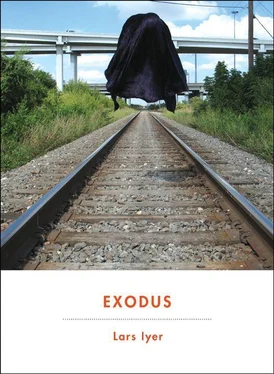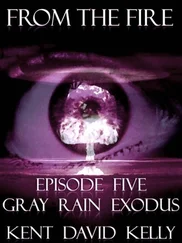W. recalls the protesting students and lecturers of the May ’68 Events in Paris. Lacan’s daughter, giving out degree certificates to strangers on the bus … Foucault, charging the police with the crowd, batons bouncing off his head … Derrida, equivocating as usual, wondering whether to act as usual. Badiou, doing revolutionary maths …
The university was in the streets! W. says. They’d turned the university inside out !
The moment’s come, W. says on the phone. They’re closing the philosophy department at Middlesex.
W. imagines them like giant crabs, the destroyers of philosophy. As giant crabs with great metallic claws. But in the end, they’ll only be managers. Manager-murderers, with profit-and-loss spreadsheets.
‘It’ll be our turn next’, W. says. ‘They’re coming to get us’. The cursor, on someone’s monitor, is already hovering over our names.
What will happen to the Middlesex researchers? W. wonders. What will become of them? There are no jobs in philosophy — everyone knows that. No jobs in academia!
They’ll be turned out into the world, W. says. Exposed to the four winds … How will they maintain the strength that is necessary for thinking? How will they sustain their self-belief? Their commitment ?
They’ll have their brilliance, that’s true, W. says. Brilliance will still throb in their temples. They’ll have their intellectual projects, half-finished as they are, it is true … But no one will understand their brilliance when they leave the university, W. says. No one will appreciate the importance of their work! And they, too, will begin to forget. They, too, will begin to lose a sense of their own brilliance, and of the importance of their work …
The shelterless thinker is a vulnerable thinker, W. says. It takes great strength to be a Maimon, a thinker-vagrant. Great courage to be a Chouchani, who was part of no institution.
W. reminds me of Robert Lenkiewicz, the Plymouth Rembrandt, who used to let vagrants live in his studio. There were about fifty of them at any one time, W. says, dossing down among the huge canvasses, most of them crazy, most of them disturbed, screaming and shouting through the night … Should W. take the new vagrants of philosophy into his study? he wonders. Should he offer the vacant rooms of his house to the sacked philosophers of Middlesex?
W. knows that I’m incapable of feeling anything about Middlesex, and for our friends in Middlesex (his friends in Middlesex). I fear only for myself, for my own position.
Ah, what haven’t I done to keep my job? W. says. What won’t I do? I’m craven, W. says. Cowardly.
I tell him about endless management meetings, and the constant process of review. I tell him about the continual rewriting of business plans and self-assessment documents, of writing reports about reports about reports …
W. imagines me in my meetings, a version of Shostakovich before the Politburo, a political prisoner, moving between stupid defiance and servile obedience.
How abject I must be! How pitiful! W. says. — ‘How many fingers am I holding up?’, my interrogator will ask me. Fuck off! I’ll shout. And then, pitifully, How many do you want me to say there are? Yes, he can see me in his mind’s eye, W. says: a gorilla in a suit, pleading for his life.
I would have been happiest in the period of show trials and autoconfessions, W. says. I would have liked nothing better than to have confessed to imaginary crimes — the greater, the better — signing every confession the police brought to me, and admitting my role in the greatest conspiracies. It would have given me a sense of importance, of epic grandeur. I did it , I would say. I was the worst of all .
It was me, it was all my fault : what have I ever wanted to say but that?
Why, in the end, do we mind so much about our departments being closed down? W. wonders. Haven’t we always thought we should be destroyed like rabid dogs?
Ah, but our punishers have no idea of our sins (of my sins), W. says. They don’t understand our shortcomings (my shortcomings). It’s their indiscriminateness we object to.
Haven’t we always dreamt of receiving a great sentence and execution? W. says. Haven’t we always dreamt of a night swarming with vengeful angels, and of St Michael’s fiery sword?
We’re not afraid of being judged, W. says. We’re not afraid of answering for our sins. But they’ll murder us in the night, these new executioners. They’ll kill us in ignorance, without realising why we should be killed, why we deserve it. We’ll go down , but not in the name of anything in particular.
This is why we’ll have to stand our ground, W. says. To save, not the ones we are, but the ones we could have been, those whose places we hold. To honour, not what we might have achieved, but what they might have achieved, had everything been different.
The desert is growing, W. says. I’m writing more, much more than he can follow, on my blog, my infernal blog. Posts about him. About us! It’s remorseless. Thousands and thousands of words. Day after day.
Don’t I know there’s a war on — a philosophical war? W. says. Why am I not marching to the philosophical front lines, like he is? Why am I not doing my bit ?
His sports science students are complaining, W. says. They don’t see the relevance of Sun Tzu and Clausewitz to badminton ethics . They don’t understand why they’re being made to study the guerrilla tactics of Mao Zedong in a module on shot-put metaphysics .
‘War has no constant dynamic’ , W. quotes, ‘just as water has no constant form’. ‘The skilful strategist defeats the enemy without doing battle’ , he quotes. ‘ The enemy advances, we retreat’ , he quotes. ‘ The enemy sets up camp, we harass. The enemy tires, we attack. The enemy retreats, we pursue’ .
If he can’t make his sports science students into a guerrilla army , W. says, he can make them into beasts of burden instead. Hasn’t he dreamt of saddling them up and riding them, placing bits between their teeth? Philosophical bits! The bits of Rosenstock! Of Rosenzweig! Hasn’t he dreamt of kicking literary spurs into their sides? The spurs of Kafka! Of Krasznahorkai!
W. dreams of mounting his last postgraduate students on the backs of his sports science students. Of combining brain and brawn, like Master/Blaster in Mad Max III . Then, he and his army would take to the hills, W. says, and get ready to charge the college in a few months time.
There are turning points in our life, W. says. Conversions. Sometimes we’re called , he says. Sometimes we’re allowed to become better than we are. God knows, that’s what we need.
What set of events would let us come into our own? , W. wonders. He sees us in his mind’s eye, clearing the rubble after a great earthquake. He sees us with a band of monk-brothers, heading into the desert. He sees us nailed to crucifixes, martyrs to some great cause …
To disappear into a larger movement!: isn’t that what he wants? W. says. To be dissolved anonymously into some great work of goodness? He’ll have to bring me with him, that’s the problem, W. says. I’ll be trotting alongside him, tugging at his habit, asking when we’re going to stop for lunch.
The trick of politics is knowing when to act, according to Debord, W. says. You have to study the logic of politics . You have to learn lessons from it. And, sometimes, you have to set the rules yourself, and follow those rules through to the end.
We need a strategy! W. says. We need tactics! We need to aim our blow, as Clausewitz puts it, on the centre of gravity of the whole war. And it is a war, W. says. Politics is war, at the end of times.
Читать дальше












